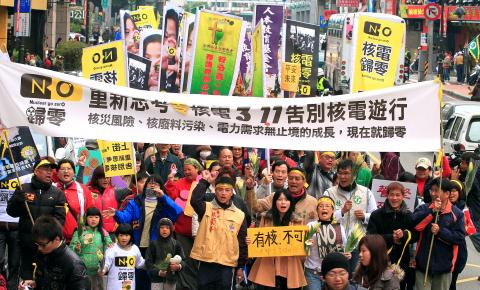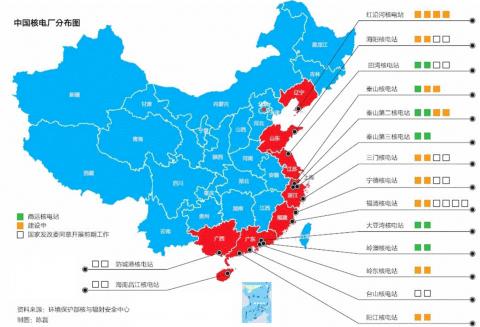Thousands of opponents of nuclear energy from across the nation paraded in the streets of Taipei yesterday to mark the first anniversary of the March 11 earthquake and tsunami in Japan, which crippled the Fukushima Dai-ichi nuclear power plant.
“Nuclear go zero — rethink nuclear power” was the main theme of the protest, during which participants urged the public to consider the risks posed by a nuclear disaster, nuclear waste contamination and unlimited demand for electricity.
At 1:46pm (2:46pm in Japan, when the earthquake struck), the crowd held a minute of silence for the victims of the disaster before moving from Longshan Temple MRT Station.

Photo: CNA
Organizers estimated that more than 5,000 people and more than 100 NGOs took part in the rally.
With processional troupes from religious groups leading the parade, protesters held yellow balloons with anti-nuclear slogans, banged on African drums while shouting battle cries and held green paper windmills symbolizing “green” energy as they marched through the streets.
Participants from the Humanistic Education Foundation held black and white portraits of themselves, similar to those used in funeral processions, saying there would be no tomorrow if a nuclear disaster occurred.

Photo: Lin Chia-chi, Taipei Times
“Many people think that the possibility of a nuclear disaster is a distant one ... but actually the Jinshan Nuclear Power Plant [in Shihmen District (石門), New Taipei City (新北市)] and the Guosheng Nuclear Power Plant [in New Taipei City’s Wanli District (萬里)] are less than 30km away from us, and the Fourth Nuclear Power Plant [in New Taipei City’s Gongliao District (貢寮)] is only 40km away from the Presidential Office,” Taiwan Environmental Protection Union secretary-general Lee Cho-han (李卓翰) said.
“We are protesting today for the children of today and tomorrow,” Lee said.
A special feature of the parade was the participation of Tao Aborigines from Lanyu, who oppose the dumping of nuclear waste on the island by Taiwan Power Co (Taipower).
“Against nuclear waste, save Lanyu. Against nuclear power, save Taiwan,” the residents of Lanyu shouted, with several people in traditional dress and occasionally performing a ritual to drive evil spirits (nuclear waste) away by shouting in a low-pitched voice.
Sinan Mavivo, an anti-nuclear activist and resident of Lanyu, said that for the past 30 years the children of Lanyu had grown up under the threat of nuclear waste in their homeland, while many people on the island have been diagnosed with cancer that has very likely been caused by radiation from the waste.
“A researcher at Academia Sinica last year confirmed there was radioactive leakage near the nuclear waste storage [facility] on the island,” she said. “But Taipower keeps trying to cover-up the fact and lies about the danger.”
Residents of the island urged the government to remove the nuclear waste immediately to protect their health and suggested that health check-ups be provided for residents.
“If we don’t stop nuclear power today, tomorrow our tears will become a river,” a wheelchair-bound protester from Keelung said.
Simulating a nuclear leak in northern Taiwan for three minutes during the march, the protesters lay down on the bustling streets in front of the Taipei Railway Station while a siren went off. The skit was to show that if there was a real threat, residents would have nowhere to go.
The parade arrived at Ketagalan Boulevard in front of the Presidential Office at about 4:20pm, where musicians played anti-nuclear songs, including The Gift from the Devil by Country Boys (農村武裝青年), while activists shared their opinions with the crowd.
Gongliao Anti-nuclear Self-Help Association chairman Wu Wen-chang (吳文樟) said construction of the Fourth Nuclear Power Plant had been going on for nearly 30 years and cost more than plants in other countries.
“The government should stop throwing money into this money pit and stop the construction of this highly dangerous plant,” he said.
The protesters urged the government and Taiwanese to learn from Japan’s March 11 nuclear disaster and rethink Taiwan’s energy policy for a safe and sustainable future.
Tibetans also took part in the parade to show solidarity with Taiwanese and voice their concerns over China’s nuclear activities in Tibet.
“Of course I should be out here taking part in this demonstration, because the nuclear issue is a global issue, and everyone should be concerned. Although I’m a Tibetan, I live in Taiwan, therefore I should be here with the Taiwanese,” said Tashi Tsering, an -India-born Tibetan. “I think nuclear energy is not safe and the government should always have the people’s safety — not economic growth — as its top priority.”
Regional Tibetan Youth Congress Taiwan president Tenzin Chompel said he was concerned about China’s nuclear activities in Tibet.
“I’d also like to express my concerns about China’s dumping of nuclear waste, as well as reported nuclear tests on the Tibetan Plateau,” he said.
Tenzin Chompel was also concerned about the situation in Taiwan.
“I live in Taipei and feel worried about being surrounded by two nuclear power plants,” he said. “Besides, I’d like to condemn the Republic of China government, which dumps nuclear waste on Lanyu [蘭嶼] that belongs to the Tao Aborigines — this is just as irresponsible as the Chinese government’s dumping of nuclear waste in Tibet.”
Additional reporting by Loa Iok-sin

AIR SUPPORT: The Ministry of National Defense thanked the US for the delivery, adding that it was an indicator of the White House’s commitment to the Taiwan Relations Act Deputy Minister of National Defense Po Horng-huei (柏鴻輝) and Representative to the US Alexander Yui on Friday attended a delivery ceremony for the first of Taiwan’s long-awaited 66 F-16C/D Block 70 jets at a Lockheed Martin Corp factory in Greenville, South Carolina. “We are so proud to be the global home of the F-16 and to support Taiwan’s air defense capabilities,” US Representative William Timmons wrote on X, alongside a photograph of Taiwanese and US officials at the event. The F-16C/D Block 70 jets Taiwan ordered have the same capabilities as aircraft that had been upgraded to F-16Vs. The batch of Lockheed Martin

GRIDLOCK: The National Fire Agency’s Special Search and Rescue team is on standby to travel to the countries to help out with the rescue effort A powerful earthquake rocked Myanmar and neighboring Thailand yesterday, killing at least three people in Bangkok and burying dozens when a high-rise building under construction collapsed. Footage shared on social media from Myanmar’s second-largest city showed widespread destruction, raising fears that many were trapped under the rubble or killed. The magnitude 7.7 earthquake, with an epicenter near Mandalay in Myanmar, struck at midday and was followed by a strong magnitude 6.4 aftershock. The extent of death, injury and destruction — especially in Myanmar, which is embroiled in a civil war and where information is tightly controlled at the best of times —

China's military today said it began joint army, navy and rocket force exercises around Taiwan to "serve as a stern warning and powerful deterrent against Taiwanese independence," calling President William Lai (賴清德) a "parasite." The exercises come after Lai called Beijing a "foreign hostile force" last month. More than 10 Chinese military ships approached close to Taiwan's 24 nautical mile (44.4km) contiguous zone this morning and Taiwan sent its own warships to respond, two senior Taiwanese officials said. Taiwan has not yet detected any live fire by the Chinese military so far, one of the officials said. The drills took place after US Secretary

THUGGISH BEHAVIOR: Encouraging people to report independence supporters is another intimidation tactic that threatens cross-strait peace, the state department said China setting up an online system for reporting “Taiwanese independence” advocates is an “irresponsible and reprehensible” act, a US government spokesperson said on Friday. “China’s call for private individuals to report on alleged ‘persecution or suppression’ by supposed ‘Taiwan independence henchmen and accomplices’ is irresponsible and reprehensible,” an unnamed US Department of State spokesperson told the Central News Agency in an e-mail. The move is part of Beijing’s “intimidation campaign” against Taiwan and its supporters, and is “threatening free speech around the world, destabilizing the Indo-Pacific region, and deliberately eroding the cross-strait status quo,” the spokesperson said. The Chinese Communist Party’s “threats